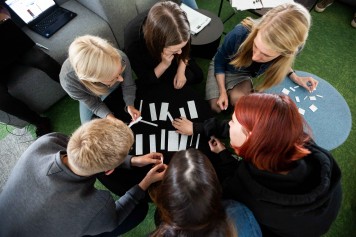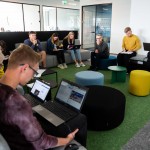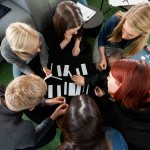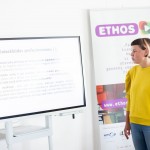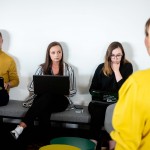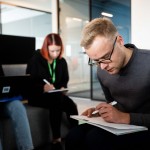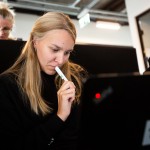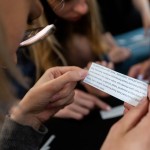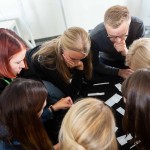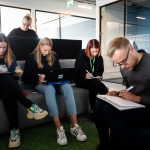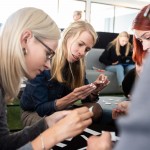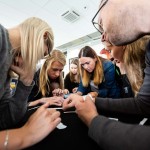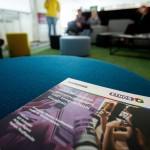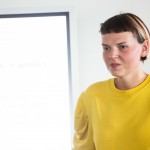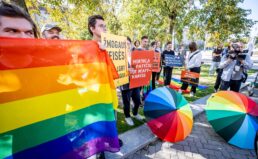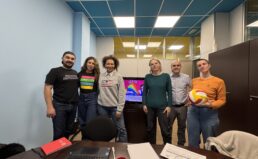On 5th of July, 2019 the National LGBT rights organization LGL organized a training about LGBT sensibility for employees of 15min.lt – the main news portal in the country. This event, organized by LGL, is part of the cycle of trainings for journalism students and professionals.
Why journalism students need trainings on human rights? How mass media contributes to forming and deconstructing stereotypes about vulnerable groups? What is the relation between popularity of mass media and the values that it declares?
Duty editor of 15min.lt Kristina Aržuolaitienė and language editor Samanta Kietytė were trying to find the answers to these questions.
There’s always room for improvement
“We were the first news media in Lithuania that openly supported Baltic Pride march.” – says duty editor of 15min.lt and the author of publications about human rights topics Kristina Aržuolaitienė.
Our interlocutress is hoping that other news portals will also contribute to cherishing human rights. Even though Baltic Pride 2019 is over and the march of LGBT community will return to Vilnius in 2022, news portal 15min.lt intends to keep on educating and informing society about various topics on human rights.
“I write a lot about human rights. I talk with members of LGBT community, I look into the problems that this group of society faces, I tell their stories. That’s why I thought it would be good to deepen the knowledge in LGBT sensibility trainings – this topic is sensate and it is important to ethically broadcast it to the society.” – says the journalist.
In 2017, in National Equality and Diversity awards, K. Aržuolaitienė received an award “The voice of the Media” for her publications. After this, she started creating “We are equal” project which reveals the topics that encourages equality.
“During the trainings we got concentrated information about how to ethically inform the readers about these topics, how to not offend people of LGBT community, as well as which topics they are missing, what collaboration opportunities they see, and which mistakes that the media does they notice. We had an opportunity to do some practice assignments and to discuss the problems that LGBT community faces.” – shares K. Aržuolaitienė.
The language editor of 15min.lt Samanta Kietytė also did not miss the chance to participate in LGBT sensibility trainings.
“LGBT topic is very relevant to me personally so I just couldn’t miss the chance to participate in these trainings. Mostly I was hoping for a good, argumentative discussion and it definitely met my expectations.” – our interlocutress said.
Easily recognizable but excluding terms
Trainings are very focused on usage of ethical and including terms. Even though the representation in the media of LGBT groups (lesbians, gays, bisexuals and transsexuals) is getting better, occasionally some media representatives name the people who belong in LGBT community as “gays”. Because of this, a big part of LGBT community feels invisible.
“Some media portals intentionally choose a particular way of speaking that humiliates LGBT people. Others, if they do make some ethical mistakes (e.g. uses a term “gay parade”), it happens unintentionally. I think these trainings help to avoid mistakes that are done unintentionally and without having the purpose of discriminating.” – says S. Kietytė.
K. Aržuolaitienė thinks that the questions related to LGBT are broadcast quite ethically. According to our interlocutress, unethical informing is common only to some representatives of media groups.
“Of course, even the media that usually ethically covers the questions related to LGBT sometimes makes some mistakes. For example, internet portals that are running after the clicks of the readers, should avoid such headlines as “born in a woman’s body” or “former woman transsexual”. These people are what they are right now, but this way their past is emphasized, even though they may not want to remember it anymore because it was too personal and painful.” – says the journalist.
Journalists, while speaking with transsexuals, should not ask them what their name was in the past or publish their old photos. Also, while talking about that part of their life, media representatives should not use any other pronoun than the one that they use. A transsexual man or a woman did not have “another gender” and they did not “become” someone else – they were always of that gender that they identify themselves with.
Žygimantas Gedvila / 15min pictures.
The most important thing is not to stop improving and learning
According to the 15min.lt journalists, similar trainings should be included into the teaching program and organized to everyone who studies Journalism.
“These trainings would definitely be beneficial to Journalism students because a part of them will work or already work in editorial offices so they without a doubt face the topics related to LGBT.” – says K. Aržuolaitienė.
It would also be useful for the journalists to expand the consciousness about the problems that other vulnerable groups (e.g. people with disabilities or refugees) experience.
“I think that the media examines the topics related to people with disabilities quite ethically, but there is a lot of space for improvement regarding migrants and refugees. I had participated in “Media4change” trainings about how to ethically broadcast the topics about the migrants and we already had some time to do an experiment.” – shares the journalist.
In June 15min.lt journalists K. Aržuolaitienė and Eglė Krištopaitytė did an experiment in order to find out how hard it is for people from some discriminated groups to rent an apartment.
Three people were chosen as the participants of the experiment – Romani woman Nijolė who lives in Roma encampment, a girl named Feyza from Turkey who studies in Lithuania and a professional coach Jean Claude who was born in Ivory Coast, has German citizenship, but for the past 11 years has been living in Lithuania.
The experiment revealed that Roma people are the most unwanted in the neighborhoods, even though most of the apartment owners were trying to say it delicately. When Feyza from Turkey was searching for an apartment, the owners were more afraid of the language barrier rather than her nationality. For Jean Claude from Ivory Coast his notoriety helped a lot.
An ethical media is a strong force while fighting against the stereotypes
Stereotypical way of representing LGBT community in the media stimulates the readers to create various generalizations about the sexual orientation and to label LGBT people. Stereotypes about LGBT community that are spread among the media represent heteronormative approach and form false expectations regarding the people of the community.
“LGBT topic is still sensitive in our society which raises a lot of debates and a wave of hate speech, that is why it is very important to ethically represent this society group in the media and not to encourage any more anger.” – K. Aržuolaitienė believes.
The articles that examine the problems that socially vulnerable groups face are often followed by comments full of hate directed towards these groups. But this is not a reason to avoid these kind of publications.
LGBT community needs objectivity and visibility. Media should encourage the respect for the variety of sexual orientations and gender identities. Rather than promoting negative stereotypes towards LGBT community (using wrong concepts, legitimizing the social isolation of the community and encouraging discrimination towards these people), media can play a major role in broadcasting the needs of the community and deepening consciousness about human rights and justice. This way it would contribute to the equality and social involvement of LGBT people.

